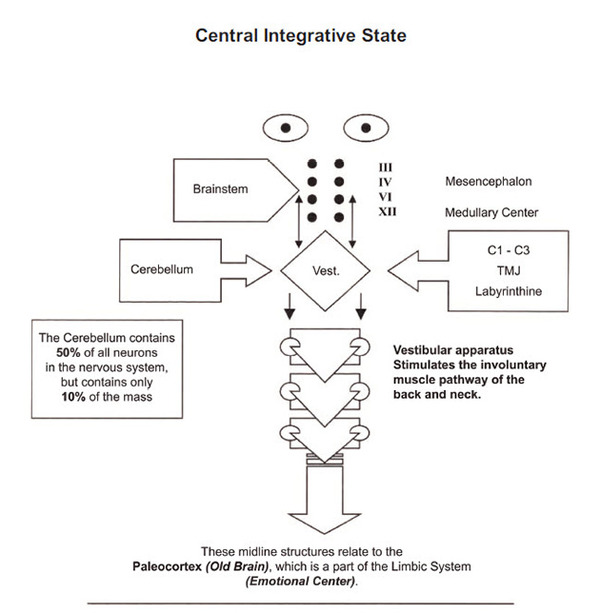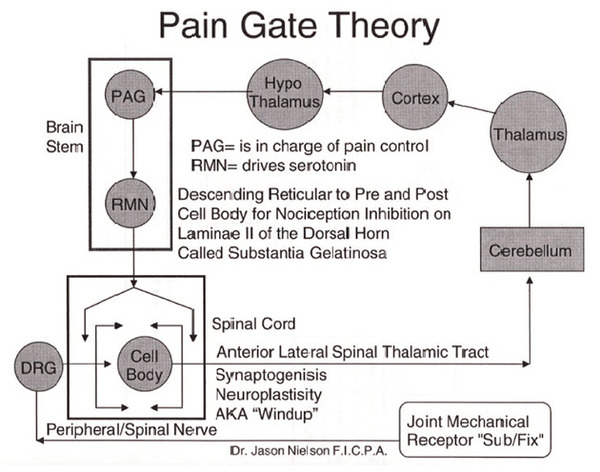
Central Integration to Help Chronic Pain and Dysfunction (Part I)
October 12, 2020 Puzzle Piece
I
have been asked recently to evaluate and treat many patients that had
not responded to Chiropractic or Medical Care. Some had seen as many as
4 MD’s, Neurologists, 2 DC’s with multiple tests, including imaging,
medications, and injections. These cases and their resistance made me
look and relook at Central Integration and combine many tools and
techniques from our past to blend all of them to accomplish marked
improvement.
After 80% improvement on one case after just one treatment, the husband,
having traveled 3 hours to see us, said, “why don’t you teach other
doctors these techniques so people can get help everywhere”. The
statement was a compliment but upset me. I explained I gave up a very
happy life and a extremely productive practice almost 20 years ago to
teach full time. He then said why don’t the doctors do what you teach?
All of us take technique classes throughout our practices and then
personalize them to us. The problem is many who have seen, have not
done. Those that follow the “Six Steps” accurately get incredible
results and prosper. I am asking all who have been exposed to these
techniques and philosophies to dedicate themselves to follow the
protocol and give the patients what they deserve in health and wellness
and what the doctors deserve in a very effective and results achieving
system of evaluation and treatment.
Central Integration encompassed into the “Six Steps”:
The human body is basically a receptor-based organism. The basal
ganglion, cerebellum, thalamus, and even the cortex, are receptor
sensitive. The brain only knows frequency of firing. 70% of the brains
function is inhibitory. Incorrect or insufficient information (sensory
input) yields aberrant function. The central integrated state is the
correct balance of inhibitory postsynaptic potentials and the excitatory postsynaptic potentials (IPSPs & EPSPs). Therefore, a neuron rests or sits if at a central integrated state simply processing the signals of excitement and inhibition in this balanced condition.

The central integrated state is changed and improved by balancing the
excitatory and inhibition potentials, which is often accomplished by
increasing afferent or sensory input, with care and a whole person
approach.
The joint mechanoreceptors of the spine are tonic receptors that fire
continuously due to the constant presence of gravity. These joint
mechanoreceptors of the spine and the muscle spindles gather and send
the greatest amount of information to the brain. To have health and
wellness and not manifest pain and/or dysfunction one must have balanced
spinal and muscle information in excitement and inhibition.
The
information from the joint mechanoreceptors goes through the cerebellum
without known communication with it, straight to the thalamus. The
muscle spindles fire directly into the cerebellum and then into the
thalamus. This integration system also receives information from sound,
sight, and the labyrinthine ear. The thalamus then sends the information
to the new (neo) cortex. The neocortex then fires or sends information
to the brain stem, through the hypothalamus. Look at the pictures included in this article.

The brain stem controls vital functions such as heart rate, breathing,
digestion and hormone regulation. It also controls central integration
functions such as balance and control of the involuntary muscles of the
neck and back. It also has parasympathetic function to inhibit the
sympathetic nervous system.
Therefore,
the greatest quantum of information that the body receives to keep us
healthy and out of pain comes from the muscle spindles and the spinal
joint mechanoreceptors. It blends and integrates this information with
the eyes, ears hearing and ears balance. Smell can also be involved.
To balance the spine and muscle spindles is paramount to wellness,
being pain free and having your chronic and potentially hopeless
patients respond. The eyes/ears need to see/hear and send the same
message the muscle spindles and spinal facets sense and send to the
brain and brain stem etc.
Tandem
treatment of the midline structures helps facilitate a central
integrative state and optimal wellness. Therefore, we also use the eyes
(Color Chart - Chakra Balance) and cranial nerves III, IV, VI, and XII,
along with integrating what the ears hear
and feel in vibration (tuning forks). The midline structures relate to
the paleo cortex (old brain), which is a part of the limbic system
(emotional center). Therefore, emotional stress is being addressed at
the same time. Smell may also need to be added to the correction.
Lack
of proper body movement causes faulty neurophysiology. We must realize
the control the body has over the brain when fixation or subluxation
yields faulty motion, nerve compression or nerve entrapment. This
results in a lack of proper joint movement and inaccurate
mechanoreception, yielding imbalance and a non-central integrative
state. We also treat fascial restriction in this equation. The
acupuncture system is imbedded in the fascia and the fascia is involved
with all the nervous systems, surrounds the brain, spinal cord and all
of the organs. Robert Fulford, DO, taught the fascia superseded the
nervous systems and integrated them together.
If the person becomes tight, in spasms and/or imbalanced in any area, they lose range of motion in that area which affects all other areas of the body. For example, if they lose motion of the anterior-posterior movement of cervical vertebrae, the IPSPs (inhibitory) overrides the EPSPs (excitatory) and pain and dysfunction occur.
References
Neuromuscular Therapy Update, Vol. V/Issue 2, (1994) pp. 14-17
This
is Part I giving the background and importance of Central Integration.
Next week in Part II, I will give you the step by step protocol for correction.
Yours in Health and Wellness,
John W Brimhall, BA, BS, DC, FIAMA, DIBAK
(Only registered customers can rate)
There are no comments for this product.